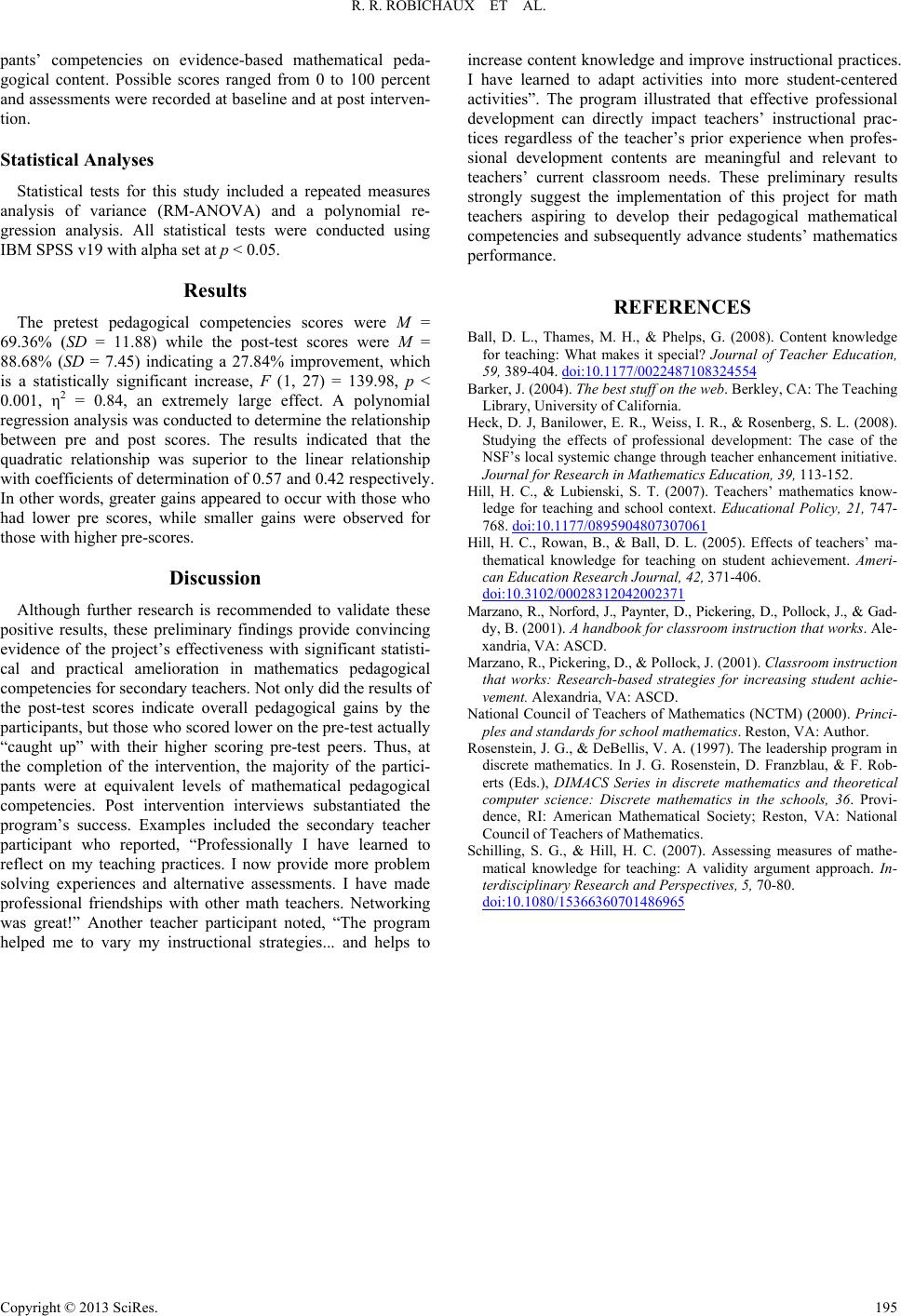
R. R. ROBICHAUX ET AL.
pants’ competencies on evidence-based mathematical peda-
gogical content. Possible scores ranged from 0 to 100 percent
and assessments were recorded at baseline and at post interven-
tion.
Statistical Analyses
Statistical tests for this study included a repeated measures
analysis of variance (RM-ANOVA) and a polynomial re-
gression analysis. All statistical tests were conducted using
IBM SPSS v19 with alpha set at p < 0.05.
Results
The pretest pedagogical competencies scores were M =
69.36% (SD = 11.88) while the post-test scores were M =
88.68% (SD = 7.45) indicating a 27.84% improvement, which
is a statistically significant increase, F (1, 27) = 139.98, p <
0.001, η2 = 0.84, an extremely large effect. A polynomial
regression analysis was conducted to determine the relationship
between pre and post scores. The results indicated that the
quadratic relationship was superior to the linear relationship
with coefficients of determination of 0.57 and 0.42 respectively.
In other words, greater gains appeared to occur with those who
had lower pre scores, while smaller gains were observed for
those with higher pre-scores.
Discussion
Although further research is recommended to validate these
positive results, these preliminary findings provide convincing
evidence of the project’s effectiveness with significant statisti-
cal and practical amelioration in mathematics pedagogical
competencies for secondary teachers. Not only did the results of
the post-test scores indicate overall pedagogical gains by the
participants, but those who scored lower on the pre-test actually
“caught up” with their higher scoring pre-test peers. Thus, at
the completion of the intervention, the majority of the partici-
pants were at equivalent levels of mathematical pedagogical
competencies. Post intervention interviews substantiated the
program’s success. Examples included the secondary teacher
participant who reported, “Professionally I have learned to
reflect on my teaching practices. I now provide more problem
solving experiences and alternative assessments. I have made
professional friendships with other math teachers. Networking
was great!” Another teacher participant noted, “The program
helped me to vary my instructional strategies... and helps to
increase content knowledge and improve instructional practices.
I have learned to adapt activities into more student-centered
activities”. The program illustrated that effective professional
development can directly impact teachers’ instructional prac-
tices regardless of the teacher’s prior experience when profes-
sional development contents are meaningful and relevant to
teachers’ current classroom needs. These preliminary results
strongly suggest the implementation of this project for math
teachers aspiring to develop their pedagogical mathematical
competencies and subsequently advance students’ mathematics
performance.
REFERENCES
Ball, D. L., Thames, M. H., & Phelps, G. (2008). Content knowledge
for teaching: What makes it special? Journal of Teacher Education,
59, 389-404. doi:10.1177/0022487108324554
Barker, J. (2004). The best stuff on the web. Berkley, CA: The Teaching
Library, University of California.
Heck, D. J, Banilower, E. R., Weiss, I. R., & Rosenberg, S. L. (2008).
Studying the effects of professional development: The case of the
NSF’s local systemic change through teacher enhancement initiative.
Journal for Research i n M a th e m a t i c s Education, 39, 113-152.
Hill, H. C., & Lubienski, S. T. (2007). Teachers’ mathematics know-
ledge for teaching and school context. Educational Policy, 21, 747-
768. doi:10.1177/0895904807307061
Hill, H. C., Rowan, B., & Ball, D. L. (2005). Effects of teachers’ ma-
thematical knowledge for teaching on student achievement. Ameri-
can Education Research Journal, 42 , 371-406.
doi:10.3102/00028312042002371
Marzano, R., Norford, J., Paynter, D., Pickering, D., Pollock, J., & Gad-
dy, B. (2001). A handbook for classroom instruction that works. Ale-
xandria, VA: ASCD.
Marzano, R., Pickering, D., & Pollock, J. (2001). Classroom instruction
that works: Research-based strategies for increasing student achie-
vement. Alexandria, VA: ASCD.
National Council of Teachers of Mathematics (NCTM) (2000). Princi-
ples and standards for school mathematics. Reston, VA: Author.
Rosenstein, J. G., & DeBellis, V. A. (1997). The leadership program in
discrete mathematics. In J. G. Rosenstein, D. Franzblau, & F. Rob-
erts (Eds.), DIMACS Series in discrete mathematics and theoretical
computer science: Discrete mathematics in the schools, 36. Provi-
dence, RI: American Mathematical Society; Reston, VA: National
Council of Teachers of Mathematics.
Schilling, S. G., & Hill, H. C. (2007). Assessing measures of mathe-
matical knowledge for teaching: A validity argument approach. In-
terdisciplinary Research and Perspectives, 5, 70-80.
doi:10.1080/15366360701486965
Copyright © 2013 SciRes. 195